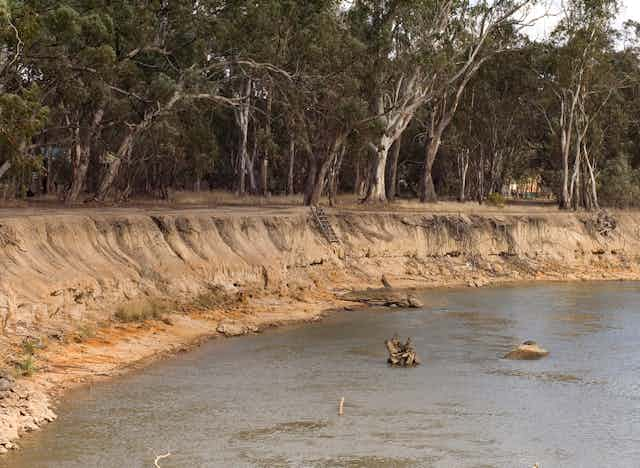In the wake of a damning royal commission and an ABC Four Corners investigation, the federal government has created an Inspector General for the Murray-Darling Basin, to combat water theft, ensure water recovery and efficiency projects are delivered properly, and essentially make sure everyone is acting as they should.
While this is a laudable aim, the Inspector General – currently former Australian Federal Police Commissioner Mike Keelty – cannot hope to do this job without knowing how much water is being used in the Basin, by whom it is used, and where.
Read more: Billions spent on Murray-Darling water infrastructure: here's the result
This might seem like basic information, but the Bureau of Meteorology, the Murray-Darling Basin Authority and state water accounts are not up to the task.
We urgently need a comprehensive audit to track the water in the Murray Darling Basin, so Inspector General Keelty can effectively investigate what he has already described as a “river ripe for corruption”.
Up the creek
Back in 2004 all governments in Australia agreed to track and provide information on water in terms of planning, monitoring, trading, environmental management, and on-farm management.
But water accounts still lack many essential features including double-entry accounting. When applied to water, double-entry accounts means that when one person consumes more water, someone else must consume less.
Read more: Aboriginal voices are missing from the Murray-Darling Basin crisis
The technology to track this already exists: satellites that can quantify surface water are successfully being used used in the United States.
If we had monthly water consumption measurements, we could see how much water is being used, by whom, when and where. This would help decision makers see problems before they emerge, such as the mass fish deaths in the Darling River, and respond in real time.
As a recent report from the Natural Resources Commission shows, without proper accounting, too much water is taken upstream – seriously harming downstream communities.
Wide support for an audit
An independent Basin-wide water audit is supported by communities and some irrigators.
In July NSW farmers voted in support of a federal royal commission into “the failings of the Murray Darling Basin Plan”. In our view, this vote shows many farmers support much greater transparency about how much water is being consumed, and by whom.
Read more: The Darling River is simply not supposed to dry out, even in drought
Double-entry water consumption accounts would help identify whether the billions of dollars planned in subsidies to increase irrigation efficiency will actually deliver value for money. But irrigation improvements only generate public benefits when more water is left or returns to flow in streams and rivers. Such flows are essential to healthy rivers and sustainable Basin communities.
Irrigators’ crops benefit from increased efficiency, so subsidies help farmers greatly – but it is very unclear whether they do anything for the public good. In fact, they seem to reduce the amount of water that finds its way back into the rivers. Research also shows infrastructure subsidies to improve irrigation efficiency typically increases water consumption at the Basin level.
Our research, published earlier this year in the Australasian Journal of Water Resources shows federal irrigation infrastructure subsidies may have reduced net stream and river levels. This is even after accounting for the water entitlements irrigators provided to the government in exchange for these subsidies.
Read more: 5 ways the government can clean up the Murray-Darling Basin Plan
Independent audits
Just like financial accounts, water accounts must be independently audited.
For the average taxpayer, who has to justify every dollar they get from the government, it’s hard to imagine how some corporations can be given millions of dollars in subsidies without actual measurements (before and after) of the claimed water savings.
If Newstart recipients need to report and manage their income and have a job plan, as part of a system of appropriate checks and balances, shouldn’t the Australian government also be checking whether billions spent on subsidies for irrigators actually saves water?
Read more: The Murray-Darling Basin scandal: economists have seen it coming for decades
A water audit would cost less than 1% of the money already spent on water infrastructure subsidies in the Basin. Unlike irrigation infrastructure subsidies, a water audit is value for money.
Importantly, independent water consumption accounts would allow the Inspector General for the Murray-Darling Basin to effectively manage our most critical nature resource, water.

